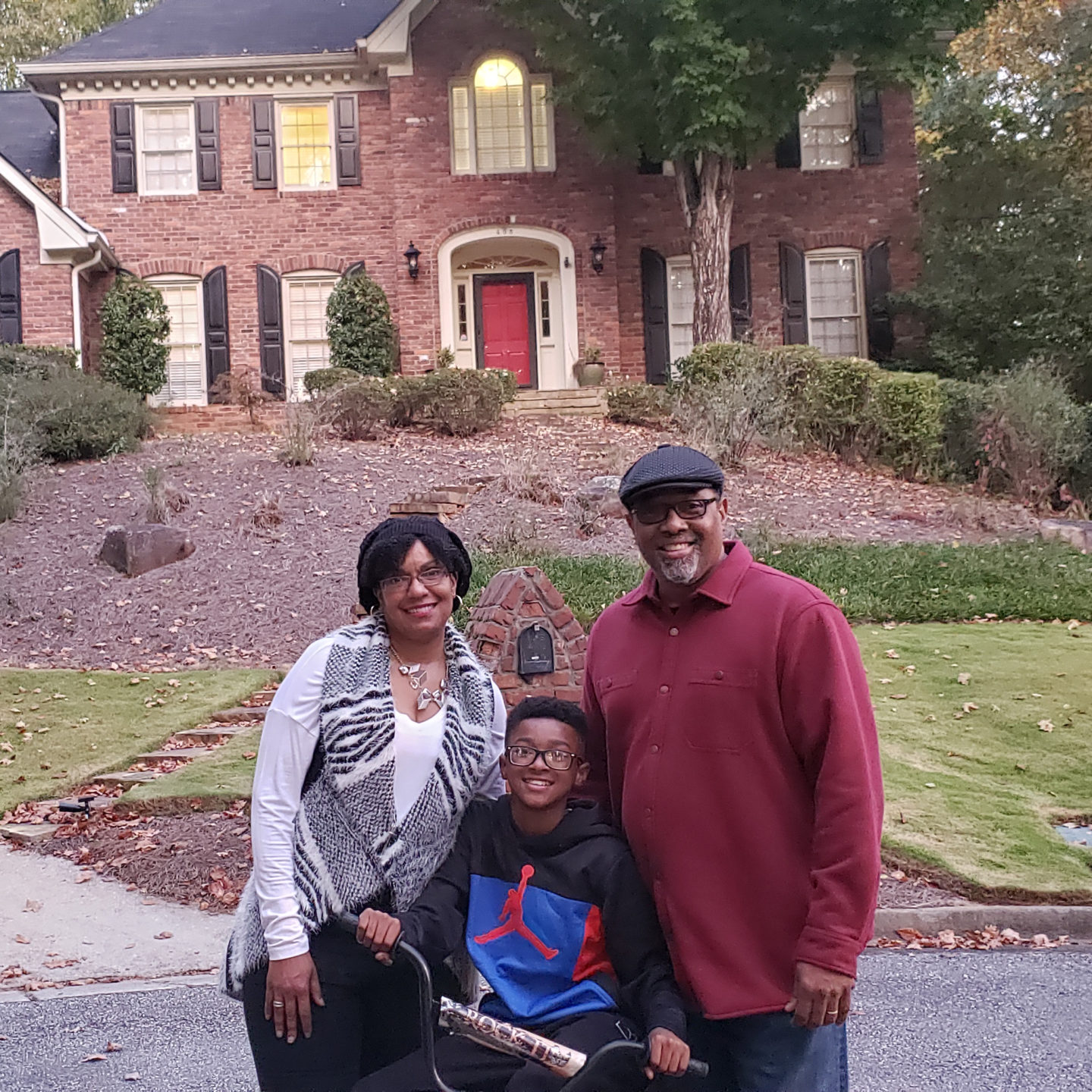Kenneth Braswell was 23 years old when he met his father. He later realized his dad’s absence had a profound effect on his career. “I’m passionate about ensuring that other children don’t experience the pain and loss I suffered as both a child and adult of not having my biological father in my life,” says Braswell, who’s spent much of his life improving the lives of underserved children through non-profit work with the NAACP, Big Brothers and Big Sisters and the Boys & Girls Clubs of America. Today, as chief executive officer of Fathers Incorporated, he’s drawing upon his own history and helping better the roles of Black fathers through programming, education and legislation. We sat down with Braswell and talked fatherhood, a new diaper campaign, the importance of literacy in at-risk communities and why Black Dads Matter.
Can you tell me a bit about your background and how you became so inspired by – and passionate about – the role of fathers?
My entry into working specifically with fathers was a result of my personal challenge in being a father. Like most people who enter non-profit work, it was on the back side of trying to understand the resources I needed to be a better father and my desire to help other dads to the same. I was already in the human service delivery as a professional, having worked for the Urban League and other not-for-profits organizations, including sitting on my local boards of NAACP, Big Brothers, Big Sisters, YMCA of the Capital Region, Boys and Girls Club among just a few. The turning point was in 2004, when I found myself in Family Court.
Did it result from your specific relationship with your father?
I was 23 years old when I met my father, so I guess you can say that he had a tremendous impact on why I do the work and why However, I will say that in the midst of work, I learned things about myself and my father. Overall, I learned that you must push to seek and understand the other side of the story. Not just the one you make up in your head. Knowing a little of my father’s narrative helped me forgive him and understand that he too was a victim of father absence.
Can you tell me a bit about Fathers Incorporated and how the program came to be?
Since 2004, our non-profit organization has served a leader in the promotion of responsible fatherhood. We do this through the use of innovative marketing and multimedia platforms, product development, training, and advocacy. Through these contract activities, we have developed and participated in a national outreach to fatherhood practitioners and dads, and have served as a trusted “Fatherhood Ambassador” in promoting and supporting responsible fatherhood across the country. I created Fathers Incorporated after a series of personal events that included a relationship break-up, suicidal thoughts, loss of business, family court experience, and a total upheaval of my life. It was then that the spiritual upbringing took over and I received a clear indication of my purpose and calling: “To Speak To Hearts Of Men.” The rest is Fathers Incorporated history.
Can you share the details behind your new Daddy Diaper Drive initiative?
We launched our Daddy Diaper Drive in partnership with Huggies and local family-centered nonprofits in Atlanta. We observed a resource gap with this population of parents and decided the campaign focus would serve low-income fathers 25 years of age and younger. Over 15,000 Diapers and other resources were donated and collected for the effort. With a jumpstart from Huggies with 10,000 diapers and wipes; designated barbershops and other businesses in the Atlanta area served as “drop-off” locations for the Daddy Diaper Drive.

Wow. That’s pretty incredible. What do you think was missing in the fatherhood conversation before Fathers Incorporated?
2004 was a difficult time to have a conversation about fatherhood, particularly for Black fathers. No one wanted to talk about the work of dealing with fathers because they were viewed as the primary source of the problem. Although we have made tremendous strides in the elevation of the conversation around responsible fatherhood, we still have a long way to go. The most significant conversation missing when Fathers Incorporated began was that of the essentialness and importance of fathers in the lives of their children. It wasn’t enough to treat fathers like they were invisible, more disturbing; not necessary.
What are some of the unique challenges to fathers in the communities you serve, and how is Fathers Incorporated working to solve them?
2020 marks the 55th Anniversary of the 1965 Moynihan Report. The controversial report argued that accelerating progress against poverty requires strengthening families in the United States—particularly through positively impacting Black men. Almost five decades after the release of the Moynihan Report, our analysis of the national data indicates that little progress has been made on the key issues Moynihan identified. Moreover, many of the issues he highlighted for Black families are now worse and are prevalent among other families. As our team has traveled the country training human service providers and engaging fathers, the overarching question we continue to hear among this population is, “Why does poverty look like me?”
No one wanted to talk about the work of dealing with fathers because they were viewed as the primary source of the problem.
What have been some of your prouder moments since launching Fathers Incorporated? What have been some of your most successful campaigns?
Whenever we receive a personal testimony about a service received or a professional interaction; those are the best. On a programmatic level, everything from our Black Dads Count campaign where we are encouraging Black Fathers and their families to complete the 2020 U.S. Census or our Million Fathers March where over 91 cities and their schools have participated in encouraging fathers to escort their children to school. We are also very proud of Real Dads Read (RDR). It was established as a male involvement literacy program in 2017. The RDR program operates by placing little libraries in barbershops and Little Free Libraries at low-performing elementary schools to encourage fathers to read to their children. The program began with 20 barber shops throughout Atlanta, Georgia. Currently, RDR has 100 little libraries across the region, many in partnership with Little Free Libraries, with 68 of those located in barbershops and 15 located in elementary schools. Seventeen barbershops are in Columbus, Georgia.
I understand you’re also a children’s book author! How did “Daddy, There Is A Noise Outside” come to be?
My first children’s book, “Daddy, There’s a Noise Outside,” takes the complex issue of protesting and breaks the conversation down so that a first grader can understand. The idea came when my six-year-old son asked my wife why I was in Baltimore on the day that the indictments were issued on the six police officers in the Freddie Gray case. To which she said to him, “Wait till your father comes home, and ask him.” That explanation transformed into a 24-page children’s book focused on helping K-5 graders understand the nuances of protest and race. The story begins when two children are awakened by noises in the middle of the night outside the window of their inner-city neighborhood. Both their Dad and Mom spend the next morning explaining to them what was taking place in their community.
Why is reading so crucial to the father experience and to what Fathers Incorporated seeks to do?
Father absence is strongly associated with poverty, poor school performance, and risky behaviors. When fathers are actively involved in the lives of their children, the children perform better in school, are more likely to be emotionally secure, and more likely to exhibit self-control and prosocial behavior. Currently, we are engaged in a literacy initiative called “Real Dads Read” aimed at children 0-8 and their fathers/male caregivers with the goals of 1) encouraging children to develop a love of reading, 2) improving children’s literacy skills and educational outcomes, and 3) strengthening bonds between fathers/caregivers and their children. Real Dads Read is a two-generation approach to engaging and improving outcomes for both men and the children for which they are responsible. We believe that this is one solution to both engaging and involving fathers in a necessary and meaningful way. There are many ways that we can have impacts on the lives of individuals and in our case, dads, but education is a foolproof way of tackling not only the issues today’s dads face, but their involvement can impact many of the educational issues our children face as well.
How is the current cultural climate and the reignited racial justice movement impacting your work?
Promoting responsible fatherhood is more important now than ever. The world is demanding positive change, and Black fathers need to be at the helm. If Black fathers are lifted up, Black families will be stronger. But this necessary change will not happen if promoting “responsible fatherhood” is used to place blame on a group of people who are often “marked” by the time they are school-aged. Rather, it must mean that as America looks inwardly at how we can be a better nation, we seek to understand the full picture of what it means to be a Black father in America. It means to take into consideration what changes need to be made in society even as we work to build the character and resolve of Black men. It means affirming Black fathers and Black lives, in general. It means declaring that Black dads matter.
What do you hope for the future of Fathers Incorporated and for fathers in general?
We are working on a campaign effort to examine the definitions and social reality of fatherhood for Black Fathers. The effort will be launched on September 29th called The Blueprint: Reimagining the Narrative of the Modern Black Father. The effort will include the creation of media content, products, and a report to inform social services agencies, businesses, government, and leaders on how to provide effective services and advocate for fathers and families.
Also, the FI Team will continue to seek and create trusted partnerships; lessons learned from years of working with fatherhood programs; and a nimble, expert-led team and staff that support the critical work of responsible fatherhood. Our values, integrity, and the priority we place on relationships and collaboration within our team and with the field undergirds project stability and fosters trust and cooperation among fathers and fatherhood program operators across the country.


